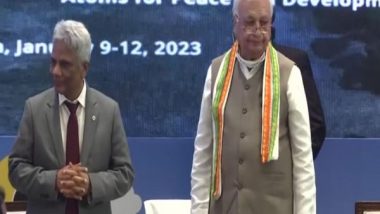Kochi (Kerala) [India], January 9 (ANI): Kerala Governor Arif Muhammad Khan on Monday inaugurated the International Conference on Radiation Technologies- Challenges and Opportunities for Sustainable Development at Kochi's Lulu Bolgatty International Convention Centre.
The four-day conference is organised by National Association for Application of Radioisotopes and Radiation in Industry (NAARRI) in association with the Department of Atomic Energy (DAE), India and the International Atomic Energy Agency (IAEA), Vienna.
Also Read | Moscow-Goa Chartered Flight Makes Emergency Landing at Jamnagar Airport in Gujarat After Bomb Threat.
"From the festival of 75 years of independence, we march towards a long season of holistic development which will culminate in the centenary of our independence in 2047. What makes our onward march special is our increased dependence and unwavering trust in the employment of scientific knowledge and technology in our developmental endeavours," Governor Arif Mohammad Khan said.
"The challenge before the scientific community, society and government are to strike a balance by finding proper solutions to optimise the use of resources and increase productivity. It is here that radiation technology can be used to optimise the use of material and energy and to improve productivity so as to encourage sustainable development," Khan added.
"Today the application of isotopes has spread to the areas like energy production, industrial diagnostic methods, archaeology, geology, ecology and astronomical sciences. In addition to their use in resource management and food preservation, isotopes are used in diagnosing diseases through 2D and 3D images, treating diseases and destroying diseased cells. Their use in implantable pacemakers, weather and tsunami warning stations, navigation signal stations, carbon dating of fossils, food preservation and above all, in national security are well known. In medicine the use of radioisotopes has revolutionised the treatments of various types of cancers and other diseases," Khan added.
Dr Ajit Kumar Mohanty, Director of Bhabha Atomic Research Centre (BARC) said that the development agenda of a country is a national imperative which has to be relentlessly pursued for the socio-economic development of its people. Radiation technology and Radiation isotopes bring sustainable development across multiple domains.
"The power reactors of DAE produce environmentally friendly green energy. Research reactors like Druva and Apsara-U at BARC produce radioisotopes for sustainable solutions across multiple sectors covering health care, agriculture, food preservation, research and industry," Mohanty said.
"Sustainable development is even more important in a way research and development are not affected and the environment is not degraded or depleted beyond replacement", Mohanty added.
SA Bhardwaj, former Chairman of, the Atomic Energy Regulatory Board said, "the unbelievable science of sub-atomic particles form the basis of many modern technologies including fission, fusion, photoelectric effects used in photovoltaic cells, medical devices and therapy, LED Lights, sanitisation of medical devices, food radiation processing, for waste treatment and much more".
"Nuclear technology for power production and a large bouquet of non-power technologies by the use of radioisotopes and radiations secreted by specialised equipment hold the promise of sustainable development, causing practically no harm to the environment or biodiversity. The environment is not only preserved by these technologies but it is upgraded too," Bhardwaj added.
PJ Chandy, Secretary of NAARRI said, "NAARRI which was founded in 1976 has been instrumental in promoting several atomic energy programs including radiation technology programs for the benefit of society. "The conference in the four days would hold 43 invited talks and 107 presentations covering divergent areas of non-power applications of atomic energy. 20% of the invited speakers are women scientists who played a crucial role in developing nuclear technology".
The conference on its first day held important scientific sessions on the expanding horizons of radiation technology in India, nuclear techniques in food and agriculture, nuclear technology beyond nuclear power applications, and advancements in theragnostic and radiopharmaceuticals production.
The conference is featuring scientific sessions on the advancements in radiation technologies in a number of fields including Radiation sterilization, Food irradiation, nuclear medicine, Radiodiagnosis and radiotherapy, NDT and industrial imaging, Radiotracer, Radiation processing for grafting and curing, Isotope hydrology for water resource management and Radiation technology equipment.
Important sessions on radiation safety, Human resources, Education and public awareness will also be held. The international exhibition on advanced radiation technologies is another highlight of the event. (ANI)
(This is an unedited and auto-generated story from Syndicated News feed, LatestLY Staff may not have modified or edited the content body)













 Quickly
Quickly


















